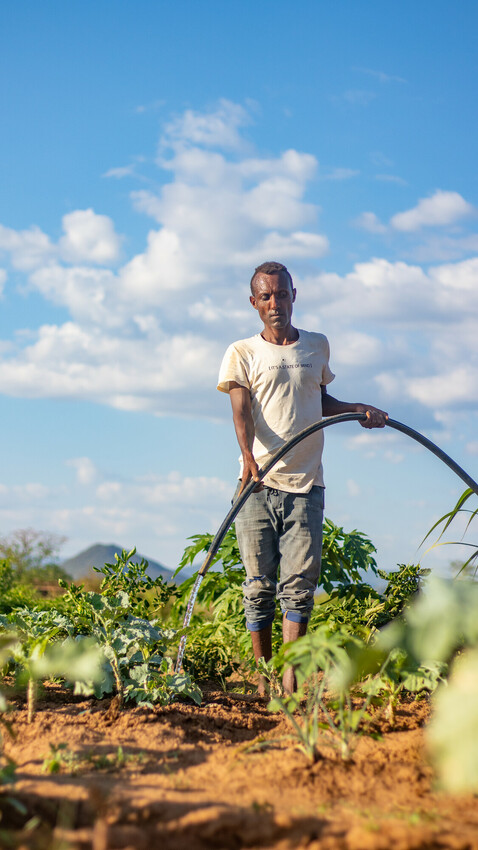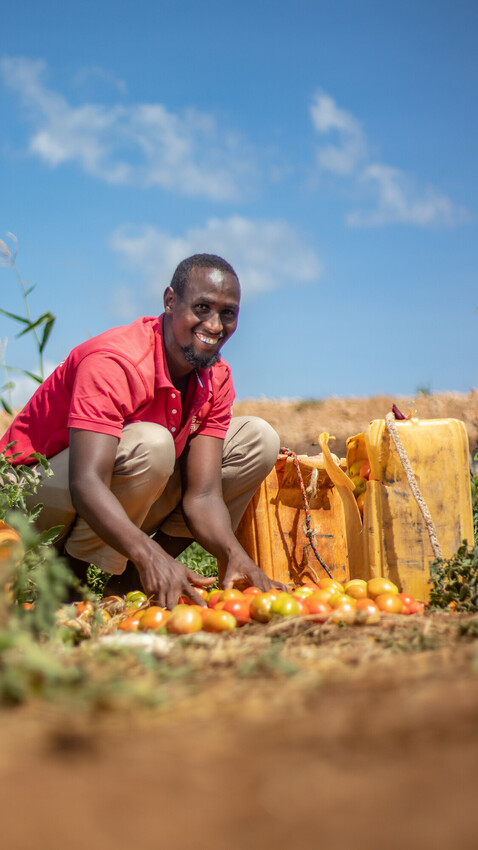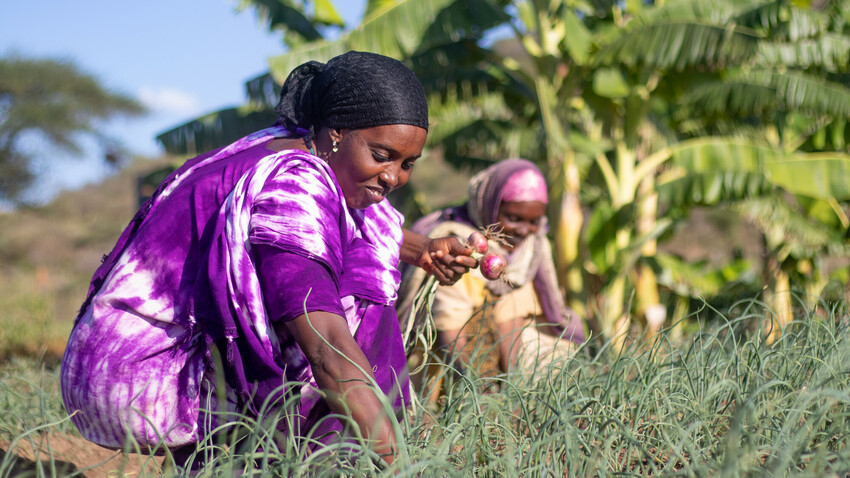Long periods of drought are depleting precious water and pasture, and having a devastating impact on food production and livelihoods in Kenya. Islamic Relief is helping communities adapt to the changing climate by building dams and implementing solar-irrigation technology, which is helping to provide food and water sources for thousands of people.
In Moyale, Kenya, a lack of rainfall together with recurrent droughts are leading to widespread hunger. Not only are droughts affecting food sources and supplies, but in a predominantly agricultural area they have destroyed many livelihoods, as local people struggle to rear animals and grow crops with little water.
Islamic Relief is running a project to help boost local economies and free families from worry about where their next meal will come from. It aims to reduce the poverty and vulnerability of pastoralist communities by supporting them to develop reliable, long-term and independent livelihoods.
In total, the project is supporting 345 farmers, and allowing 3, 000 families gain better access to food.
Solar-irrigation technology
The project is helping communities build resilience against the effects of climate change. Farmers are given the equipment they need to implement solar drip irrigation technology. This helps in food production and helps combat the effects of a lack of water on pastures.
Solar drip irrigation technology involves pumping water from a storage tank. The water then drips onto individual plants through perforated tubing. Compared to diesel-powered pumps, solar-powered technology provides a cost-effective, long-lasting irrigation solution with minimal maintenance and repair.
We set up groups which are providing farmers with essential training, support and advice around the new technology and farming methods, as well as advice around adapting to climate change. 300 farmers were also given assorted drought-resistant seeds and farm tools to help them rebuild their livelihoods.
To help improve food supplies on a broader level, we have also been working with Moyale’s Department of Agriculture, Livestock and Fisheries to help promote food production through food shows and demonstrations.
Improving access to water
Islamic Relief have also been working to help communtiies in Moyale gain access to water for farming, livestock and everyday use. We repaired shallow wells and built a mega-dam that stores rainwater for irrigation during the dry season. We also provided farmers with 20 water tanks, each with a capacity of 5,000 litres to help them store water.
Islamic Relief staff then set up an operations and management committee to provide essential training in order to help manage the community’s water resources.
20 acres of land around the Moyale mega-dam has now become suitable for farming. The farms are supplied with water via solar power, with driplines feeding directly onto the plants to optimise water use and reduce losses. Farmers are now growing crops including maize, beans, kale, onions, tomatoes and fruit.
“Initially we could only grow crops on 4 acres of land because of the limited access to water. The support of Islamic Relief has meant we can now grow crops across 36 acres”, says David Muturia, from Moyale’s Agriculture, Livestock and Fisheries Officer.
“We have observed an increase in the number of groups engaged in farming. We previously had 3 groups, and now we have more than 15 groups involved in horticultural activities.
“The farmers can now harvest and sell kale 3 times a week for 3 months, and they are earning a good living from doing so. Other farmers are replicating the crop production techniques introduced here”, says David.
Happy farmers
“I was an artisanal gold miner, relying on luck to support my 2 children. Previously we had no water and farming knowledge”, says 26-year-old Juma, who is benefitting from Islamic Relief’s project.
“In 2019, I decided to try farming when Islamic Relief constructed the mega-dam in the Guyotimo area. I managed a produce 20 bags of maize, 5 bags of beans, 7 bags of cowpeas and 2 bags of green beans on my first harvest.
“I made a good income and my family ate the food. During a 3-month season of tomatoes, I can earn £19 per day from the sale of tomatoes. Our children are healthy because they now eat food fresh from the farm, unlike before where we relied on buying food from the shops”, says Juma.
The project is also benefitting 60-year-old Dida. After 50 years living as a refugee in Somalia, he returned to Kenya in 2017 with no source of income, and was forced to earn a living from illegal logging and charcoal burning to provide for his family.
“We are grateful (to Islamic Relief) for piping the water to our farm, the farming knowledge and technology. We are now well-resourced and my life has completely changed from the days of charcoal burning. I have been able to buy 2 goats, a second-hand motorbike for farm supervision, and I am married and we have a child.
“My farming group has since expanded to managing2 acres of land. I have 40 big fruit trees like oranges, guava and lemons on the farm. On the first farm, we harvested 100-200 papayas every week and earn a good living”, says Dida.
Empowering women in the community
The project is helping to empower women in the area, and giving them a reliable source of income.
“ In the past, farming was associated with men, but Islamic Relief’s solar drip irrigation project has allowed women to participate also”, says Rukia, chairperson of her farmers groups.
She has found that many women are now able to help support their families with the income they earn from selling their produce.
“Selling vegetables from our acre of land has improved our families’ incomes. We are relieved that we can support our husbands to meet the basic needs of the home. Our staple food was ‘ugali’ and milk. Now we are growing green vegetables that are good for our health, “says Rukia.
Agriculture and livestock are integral for rural commintites to be able to feed their families, and ultimately, to survive. Islamic Relief continues to build resilience and reduce the vulnerability of rural communities affected by climate change.
With your support, Islamic Relief can support even more people to change their lives – and their futures. Donate today.













